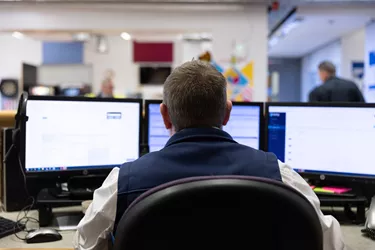The financial trouble caused by Statutory Sick Pay had a huge impact on my mental health
Jenny blogs about why Statutory Sick Pay (the legal minimum rate of pay that your employer can pay you when you’re off sick) is too low and why things need to change.
The financial trouble caused by Statutory Sick Pay wasn't just a drop in pay, it was the difference between being evicted or not, between eating or not. It had a huge impact on my mental health. I've never felt so trapped in my whole life. My experience during this time made me feel that there is no safety net and no support for people facing a crisis.
Earlier this year I became ill and was off work. My employer’s sickness policy was two weeks full pay, then Statutory Sick Pay for any additional sickness after that. This did not increase with length of service.
"The financial trouble caused by Statutory Sick Pay wasn't just a drop in pay, it was the difference between being evicted or not, between eating or not."
I have long term mental health challenges (which I had disclosed) which were exacerbated by the job, and had already used up the two weeks full pay prior to being signed off during this period.
Before I went off sick, I knew I would only get Statutory Sick Pay and was extremely concerned, but I was in an awful place at the time and had been having thoughts of harming myself, so I was in no fit state to be in work.
Perhaps if I hadn't been so worried about the low rate of Statutory Sick Pay, I might have taken a shorter amount of time off sick earlier on, and not been pushed to the point I got to, where I had to be signed off for an extended period.
The low rate of sick pay caused me serious financial trouble. For a start, Statutory Sick Pay didn't even cover my rent which is £600 a month for one room in a house share. This is probably the lowest rent I could be paying in my area so it's not like I am living in a mansion and expecting Statutory Sick Pay to cover it.
"The possibility of being evicted and potentially made homeless is probably one of the most stressful things anyone can experience."
The possibility of being evicted and potentially made homeless is probably one of the most stressful things anyone can experience, whether they have a mental health problem or not, so when I was already in such distress it pushed me to such a dark place that I don't like to think about it.
On top of this, I have been waiting for some specialist therapy from the mental health team since last summer, and was midway through a series of assessments when this all came about. I was told that if I moved out of the borough I would lose my place on the waiting list, so this added another facet to the stress of not being able to pay my rent and possibly having to couch surf or move elsewhere - I could lose the healthcare I had been waiting so long for and really desperately needed because I was no longer in the area the team covered.
In the end, I was off for six weeks. I was in no way well enough to go back to work, but I could not afford to take any more time off sick, for the reasons highlighted above.
"I was in no way well enough to go back to work, but I could not afford to take any more time off sick."
I still don't feel well enough to work, at least definitely not full time, and my mental health team has said the same and advised me to at least reduce my hours, but this experience has shown me that there is no safety net if you are not well enough to keep working. So I am just trying my best to carry on, but I’m worried at some point I may crash and burn and physically not be able to keep going.
I was extremely fortunate in that shortly after this period of sickness, I was offered a new job. I now work for an employer with a far better sickness policy, meaning I am nowhere near as worried as I was about having to take time off sick as with my previous employer. This, coupled with the fact that my new employer has much more awareness and understanding around mental health anyway, as meant that things on that front are much better.


Our campaigns
We'll fight your corner. We believe everyone with a mental health problem should be able to access excellent care and services. We also believe you should be treated fairly, positively and with respect.
Share your story with others
Blogs and stories can show that people with mental health problems are cared about, understood and listened to. We can use it to challenge the status quo and change attitudes.

















